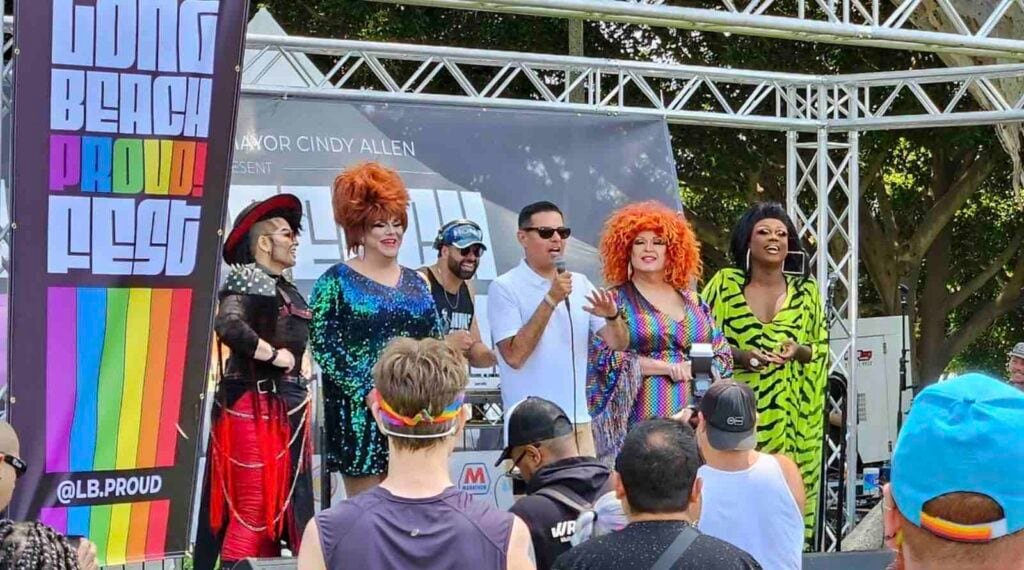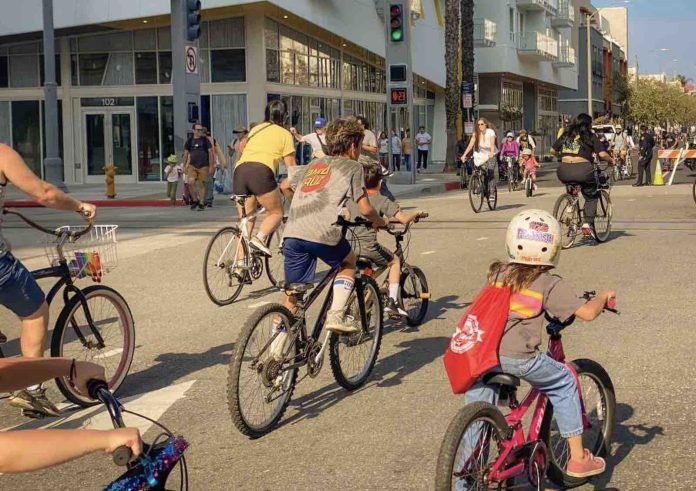Stepping into Bixby Park this past Saturday—May 20, only the second time the event has taken place in the past three years—there was a vibe that hasn’t really been felt in a long time, either at the park itself or along the Gayborhood’s main corridor.
There was a sense of belonging and bubbly boisterousness, camaraderie and celebration, and a genuine reclamation of our streets and park spaces as human spaces; as spaces worthy of community, connection, and inclusivity.

The central hub to this year’s Beach Streets—also known as a ciclovía, a car-free event which momentarily hands back the roads of cities to basically anything without a motor, be it your bike, skateboard, stroller, skates, wheelchair, or your very two feet should they be able to used for walking—was at Bixby Park, where Vice Mayor Cindy Allen and LB Living hosted the Long Beach Proud! Fest.
The point of a ciclovía supersedes just transferring the privileges of a car to a bicyclist or a skater or… It is also suppose to provide power to the human as a simple tool; that we, in and of ourselves, are tools of power. And forgive the grandiose idea that I believe a human—without much beyond its physical form—is a grandiose form in and of itself.
With tens of thousands of people taking over nearly every inch of the three-parcel park, bicyclists en route from either the DTLB hub at Pine Avenue and 5th Street or the eastside hub at Broadway and Euclid Avenue had a rest stop which included stages with live music and drag performers, vendors, food trucks, spaces for the kids, full bars and beer gardens, drag queen reading hours, art displays…
It was an event so well-attended, so well-like that it honestly should be an annual thing.

“Community activation is what makes this type of thing happen,” Mayor Rex Richardson said to me shortly after taking to the stage to happily greet people displaying Pride flags. “You can’t have an event on one hand without the community in the other—and for future Beach Streets, I think it is essential to have activation like the one here in Bixby Park.”
LB Living owner and Long Beach Proud! co-founder Sal Flores echoes this sentiment: “I think Long Beach Proud! and Beach Streets were so successful is because it was all about our community. I can proudly say, Proud! Fest truly showed what our queer community is all about: inclusivity, acceptance—but most of all love. We as a city need to embrace and demand more events like this, more events that benefit our communities, our neighborhoods, our small businesses, events that embrace our diversity—what more proof do we need than this past weekend?”
And both are right: Last year’s event along the “University” route was not nearly as attended as the Broadway route. And while there are several explanations that range from surface level to genuine concerns to the lingering effects of the pandemic—”Downtown and Alamitos Beach are more popular,” “There is no easy Metro access point,” “Yes it was outside, but many were still wary of large group events”—there is some weight to the fact that the University route wasn’t well activated nor was the community heavily involved.
There were people using their own driveways as spaces for games or candy to passersby. There were small businesses with doors wide open and tables set up to simply talk about their business. Groups of folks who set up an acoustic music mini-hub at a random corner. Some formally sanctioned; some done by the neighborhood with nothing more than their own choices.

This idea was more impactful by the fact that I chose to eschew my two-wheeled steel Specialized steed in favor of my own two feet.
Now mind you, it is always hard to understand this point about the power of walking: we are continually inundated with speed and it is important to examine it—something I have been programmed to perpetually think about after reading what philosopher Paul Virilio called “dromology,” the study of speed: “Acceleration has been the prime cause of the proliferation of major accidents.”
We, as humans, have always felt the need to do what we do faster—beyond stronger, beyond smarter, beyond more efficient: just faster.
And it is the delicate things in life we miss when we engage in that, particularly how incredibly removed the world is from human scale.

The point of a ciclovía supersedes just transferring the privileges of a car to a bicyclist or a skater or… It is also suppose to provide power to the human as a simple tool; that we, in and of ourselves, are tools of power. And forgive the grandiose idea that I believe a human—without much beyond its physical form—is a grandiose form in and of itself.
It really is.
“Community activation is what makes this type of thing happen. You can’t have an event on one hand without the community in the other—and for future Beach Streets, I think it is essential to have activation like the one here in Bixby Park.”
Why more people should take to the streets sans their vehicle is to simply remind others of how their environment was created. Urban centers aren’t the Rockies, they are not Yosemite, and they are not the vast stretches of Death Valley. They are entirely manufactured by humanity—and that is what makes their beauty so specific and unique. It is what causes every person to pause at the skyline of a major city: It is something that doesn’t exist in nature and yet grew precisely out of it through humanity.
And so I opted to take to Beach Streets by foot.

I am, after all, an avid walker—though that was never necessarily by choice: having to sell my car to help pay for my masters degree, I bought a bike which was eventually stolen which in turn forced me to use my feet.
It was single-handedly one of the best and most life-altering things I was forced to do: explore my city by foot. It was through this exploration that I hit the harsh reality that we do had stopped created urban centers for humans: there was not a single thing to help dwarf the sense that one was a meandering amoeba in search of accessibility.
This thought was on repeat for the vast majority on the stretch of Broadway that was closed for All Things More Human that day.
And as I saw the furrowed brows and quiet scoffs of the bicyclists who had to pause, slow down, or outright stop for pedestrians—something I was often guilty when I was much riskier speed demon than I am on my bike nowadays—it was a quick reminder that even beyond just getting out of our cars, every now and then we should get off our bikes should we have the ability to use one.
Though the frustrated bicylists’ reactions to being slowed down sparked the idea that we need to be on our feet more, the idea was smacked outta the ball park at one particular moment: a young person in a wheelchair, paused in the middle of Broadway in the middle of the Gayborhood. With bikes and scooters flying around, this person was just simply paused. They looked around gleefully, smiling and saying hi to bicyclists and skaters as they zoomed around them.
It was likely the first time they’ve ever had the chance to just occupy a public space in that capacity.
I once said that there is a mutual understanding that urban, dense environments are going to provide discomforts—parking constraints, occasional noise interruptions to your quiet living room, traffic—but that the vibrancy of the urban ballet, as long as it is safe and ripe with human activity, far outweighs those concerns.
Part of that ballet is just being human—and I mean that in its physical sense: using your two feet and walking or your two arms to push your wheelchair or your electric wheelchair should you need it. “The passions have been sufficiently interpreted; the point now is to discover new ones,” in the words of a Frenchman. The passions—biking infrastructure, clearing the public real estate of its preference towards machines rather than humans, clustering together as humans—have been identified but now it is time to take the next step (literally).
Go on a dérive.
Feel small.
Ignore the destinations—betrayals if there ever were any.
Stop for a pause, be it with your mode of transportation or your brain’s racing, making traffic go around you and notice you and recognize you.
Make the city yours: that is what the city is there for.



Walk, walk, walk. Humans evolved to walk. The scale of bikes, ebikes, and cars take us further away from that. Besides the known health benefits walking can afford us a deeper connection to our community and to the people that live in it. This Beach Street and it integrated connection with Proud! was one of the greatest examples of what makes LB so special.